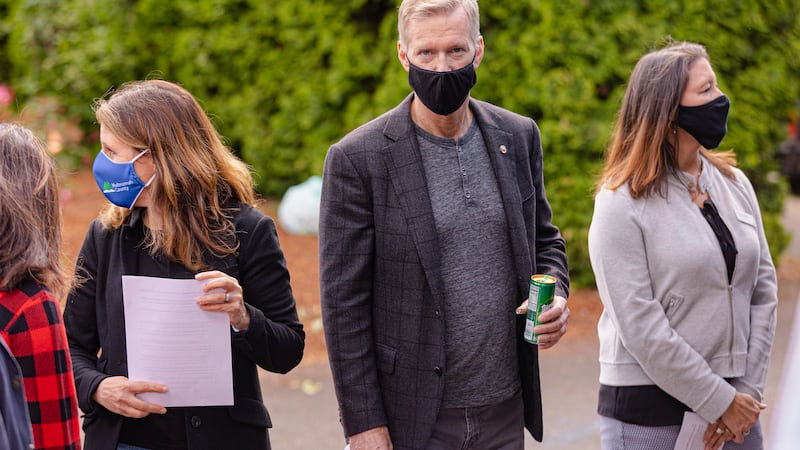For decades, Portland mayors and good-government wonks have complained that Portland’s “weak mayor” form of government leaves the top city official with few avenues for decisive action. One way to circumvent that roadblock: make emergency declarations that give you powers over the city’s bureaus that you wouldn’t otherwise have.
That’s what Mayor Ted Wheeler has done over the past month in a series of emergency declarations that give him powers he wouldn’t otherwise have in the form of government Portland uses.
Wheeler’s three declarations so far—all related to homeless camping—have given him some control over bureaus not under his oversight. That’s a departure from typical City Hall practice, in which commissioners closely guard the bureaus they’ve been assigned.
Mike Lindberg, a former city commissioner, says he’s never seen emergency declarations used so liberally by a mayor.
“Up until this [homelessness] crisis, declarations were only used for natural disasters such as the Mount St. Helens eruption, extreme snow, and ice storms and flooding,” Lindberg says. “So, natural disasters.”
Wheeler’s office has said he plans to treat the city’s homelessness crisis like a natural disaster. And all three emergency declarations have focused on centralizing power over clearing campsites and sheltering people.
On Wednesday morning, Wheeler announced his third declaration: a plan to streamline homeless outreach to people living on Portland’s streets. He’ll do that by having bureau employees who interact with homeless Portlanders report to a centralized office under the mayor’s purview: the Street Services Coordination Center. The declaration recruits Portland Parks & Recreation, the Police Bureau, Portland Fire & Rescue, and the Portland Bureau of Transportation, among others, to reduce unsanctioned camping by helping campers access shelter beds, treatment centers and medical care.
Mike Myers, the community safety transition director in the mayor’s office, will lead the center.
The approach, first reported Wednesday by The Oregonian, is modeled after a response a city might take after a natural disaster: create a central command center that expedites help and streamlines access to services. (The mayor says he is not asking other bureaus to take any more of an enforcement role against unsanctioned camping than they otherwise would.)
Wheeler first used emergency declaration powers on Feb. 4 when he banned camping along highways and a matrix of the city’s deadliest streets, called the “high-crash corridors.” That gave him jurisdiction over Portland Bureau of Transportation-owned roads, circumventing the approval of PBOT’s commissioner, Jo Ann Hardesty.
Last week, he used an emergency declaration to assume control over four properties, including three city-owned parcels, for use as safe rest village locations (and handed off authority to Commissioner Dan Ryan, whom he enlisted as his “designee”).
With this week’s declaration, Wheeler granted himself authority over programs across multiple bureaus that touch homelessness. However, unlike the highway camping ban, he’s received general support for the idea from other commissioners, even if they’re still unclear about the operational details.
(Until this winter, Wheeler had declared several states of emergency, all related to unforeseen events: for COVID-19 in March of 2020 and again in April in preparation for civil unrest after a jury convicted Derek Chauvin in the murder of George Floyd. He’s also declared emergencies over inclement weather.)
The mayor bemoaned the “siloed” commission form of government for its slowdown of delivering basic services: “Our form of government does not make it easy to coordinate across numerous bureaus and external agencies to provide consistent services to those living outside,” he said at a March 2 press conference, and added that the center “cuts through our antiquated form of government to speed up better services.”
A group of Portlanders are currently crafting recommendations for a future ballot measure offering voters a chance to change the outdated form of government Portland uses. That once-a-decade body, the Charter Review Commission, shared publicly an initial set of agreements between a majority of the members in February. Two of the agreements reached were that commissioners should be elected by district to increase representation for East Portlanders who have been underrepresented for decades on the City Council, and to abandon the current system wherein commissioners are tasked with managing bureaus.
Wheeler hasn’t waited for the voters. With each order, Lindberg notes, he’s overriding the bureau assignment system.
“I think what he’s done is to use the emergency declarations to strengthen his role, to give him more power, to really get something done,” Lindberg says, adding that it was “a move to strengthen his hand.”
When asked how many emergency declarations would follow, Wheeler said: “Indeterminate, and as many as necessary.”
This article was published with support from the Jackson Foundation, whose mission is: “To promote the welfare of the public of the City of Portland or the State of Oregon, or both.”
